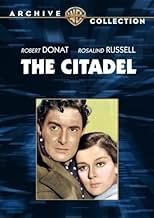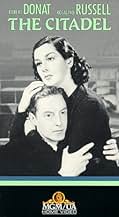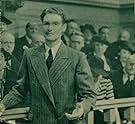IMDb रेटिंग
7.0/10
2.5 हज़ार
आपकी रेटिंग
अपनी भाषा में प्लॉट जोड़ेंAn enthusiastic young doctor happily embarks on his career, but it isn't long before he finds out what being a doctor really entails.An enthusiastic young doctor happily embarks on his career, but it isn't long before he finds out what being a doctor really entails.An enthusiastic young doctor happily embarks on his career, but it isn't long before he finds out what being a doctor really entails.
- 4 ऑस्कर के लिए नामांकित
- 9 जीत और कुल 4 नामांकन
Penelope Dudley-Ward
- Toppy LeRoy
- (as Penelope Dudley Ward)
Francis L. Sullivan
- Ben Chenkin
- (as Francis Sullivan)
फ़ीचर्ड समीक्षाएं
"The Citadel" is one of those circular morality fables - idealistic young man sets out full of good intentions to put the world to right, but, finding his dreams dashed by prejudice and ignorance, throws in his lot with the protection of an easy but dishonest life only to realise the error of his ways through personal tragedy with consequent redemption. A;though stylistically and culturally a world apart, it is thematically a precursor of Mizoguchi's "Sansho Dayu". Made in great Britain in 1938, its MGM backing certainly shows in higher production values than most home grown films of the period - and this in spite of much reliance on back projection of the sort that even the great Carol Reed could not always effectively disguise. One of Hollywood's top directors, King Vidor, invests it with visual quality and, in a part that could have been tailored for Greer Garson, Rosalind Russell makes a surprisingly convincing female lead, supporting the hero throughout his tribulations with every ounce of Garsonian understanding he needs. But it is Robert Donat as the idealistic doctor, who first tries his professional hand in the dark Welsh colliery valley, that is the film's greatest strength. Here was an actor who brought a sense of dignity and integrity to every role he undertook from the earliest Richard Hannay to the Chinese nobleman in "The Inn of the Sixth Happiness" which he was brave enough to play when he was literally gasping for breath. His performance in "The Citadel" is not entirely free from cliché but I imagine this was something imposed by the conventions of the period. How else to explain that when he becomes mean and mercenary he suddenly sports a very short and unsympathetic moustache which, if memory serves me right, miraculously disappears for the final scene of redemption. For the rest there is a galaxy of British acting talent to be found among the supporting roles with a brief glimpse of the dignified Nora Swinburne and a few more of a youthful Francis L. Sullivan doing his obese bigot stuff with rather less brains than usual. And as if this was not all, there is "Sexy Rexy" Harrison gracing the Harley Street scene, Cecil Parker playing a particularly odious surgeon who would no doubt be struck off the Medical Register if he were around today and the great Ralph Richardson investing the role of Donat's best friend with just about the right amount of Shakespearean rhetoric that the part will support. All in all a veritable treat provided you suspend just a little bit of disbelief.
I found the performances of Donat and Russel fascinating so many years after the film was made. A J Cronyn's story is relevant even today and that makes the film entertaining. King Vidor needs to be complimented on getting such wonderful performances out of the leading pair as well as Rex Harrison and Ralph Richardson. Mary Clare as Mrs Orlando was also an interesting though brief performance. Harry Stradling's camerawork is impressive, if taken in perspective of the film's vintage.
What is a shame is that Rosalind Russel was not picked up by good directors for meaty serious roles, after this noteworthy performance.
What is a shame is that Rosalind Russel was not picked up by good directors for meaty serious roles, after this noteworthy performance.
A.J. Cronin's book "The Citadel" was adapted for a 1938 film starring Robert Donat, Rosalind Russell, Ralph Richardson, Rex Harrison, and Emlyn Williams, directed by King Vidor.
Donat plays Andrew, a young, idealistic new doctor who goes to work in a small Welsh mining town, where he marries a pretty schoolteacher, Christine (Rosalind Russell). Many of the miners have a persistent cough, and he becomes interested in finding the cause. But the miners have little understanding of the big picture and just want the "pink medicine" the old doctor gave them, which just helped their symptoms.
Thwarted at every turn, Andrew and Christine move to London, where Andrew opens a practice. Then he has a change of fortune when he runs into an old friend (Rex Harrison) who gets him on the society doctor track, where he gets big money for treating hypochondriacal patients and by merely being present while a surgery is being performed, or taking a referral.
A beautiful movie with the underrated Donat turning in a wonderful performance of quiet intensity. Russell's expressions say more than her words - you know exactly how she's feeling. Ralph Richardson -- was he ever bad? - plays Andrew's old friend Denny, who notices the change in Andrew's goals.
A.J. Cronin was one of the authors whose novels were often adapted for film in the old days: "The Spanish Gardener," "The Green Years,", "Keys of the Kingdom," "Bright Victory," "Vigil in the Night," and others. Some of his stories involve medicine/science and sacrifice/dedication. Those books made for some inspiring films in the '30s and '40s.
Donat plays Andrew, a young, idealistic new doctor who goes to work in a small Welsh mining town, where he marries a pretty schoolteacher, Christine (Rosalind Russell). Many of the miners have a persistent cough, and he becomes interested in finding the cause. But the miners have little understanding of the big picture and just want the "pink medicine" the old doctor gave them, which just helped their symptoms.
Thwarted at every turn, Andrew and Christine move to London, where Andrew opens a practice. Then he has a change of fortune when he runs into an old friend (Rex Harrison) who gets him on the society doctor track, where he gets big money for treating hypochondriacal patients and by merely being present while a surgery is being performed, or taking a referral.
A beautiful movie with the underrated Donat turning in a wonderful performance of quiet intensity. Russell's expressions say more than her words - you know exactly how she's feeling. Ralph Richardson -- was he ever bad? - plays Andrew's old friend Denny, who notices the change in Andrew's goals.
A.J. Cronin was one of the authors whose novels were often adapted for film in the old days: "The Spanish Gardener," "The Green Years,", "Keys of the Kingdom," "Bright Victory," "Vigil in the Night," and others. Some of his stories involve medicine/science and sacrifice/dedication. Those books made for some inspiring films in the '30s and '40s.
A look at the medical profession today will convince anyone that this narrative of the conflict a sensitive young physician experiences: whether to serve the not-especially-appreciative poor or the hypocond- riac and over-appreciative wealthy, if he caters to their whims. (At the end one wonders how great a difference there is between these two constituencies.) How many medical school graduates today choose to into small-town or rural general practice, as opposed to pursuing lucrative specialist careers? Robert Donat's effective performance is, as usual, understated; while Rosalind Russell easily matches him in a portrayal that makes one regret that she later became typed in comic roles as a result of superb performances in that genre. A supporting cast that includes the youthful Rex Harrison, Emlyn Williams and Ralph Richardson, all early in their careers and all with perfectly formed characteriza- tions, gives the film depth that one might not have anticipated. This is one of those films that makes one regret the loss of the old studio system, which enabled MGM, with its guaranteed bookings, to make a prestige film on a serious social issue with relatively few melodramatic excesses; and to offset probable box office losses by the studio's many box office bonanza romantic, comic or musical star vehicles. And today??
I wasn't too sure what to think of Vidor after Our Daily Bread. Usually, filmmakers who have a message to get across, and who don't do it all that subtly, rub me the wrong way. But after seeing The Citadel i'm starting to rethink King Vidor. Indeed i thought Our Daily Bread a very fine film, certainly from the standpoint of direction. But what Bread lacked in the two lead performances (which are quite corny and camp), has been perfected in The Citadel, where we are given two marvellous performances from Robert Donat and Rosalind Russell. And i didn't have the same feeling about Vidor's message-making in Citadel that i did in Bread. It is more subtle in Citadel, and also for a better cause (altruism in the medical profession, a very noble thing, as opposed to socialism, the subject preached about in Our Daily Bread). But now i've started thinking this about Vidor:
He was a passionate artist - how much do i prefer this to someone like Rossellini who didn't think much of movies, or someone like Bergman, who often (he can be optimistic) depicts human nature as an empty, valueless abcess. The fact that he expresses such strong messages, and that in fact he has something that he finds of value, is immensely reassuring. I get so used to railing against preachy filmmakers that i seem to equate non-preachiness with cynicism, and even nihilism. Well, one doesn't have to dispise everything to make a wonderful film, which is what Vidor has done here.
Everything works in The Citadel. It draws you very nicely, without pomp or flashiness, but with immense skill, into its environment, and what a lovely environment it is. You so badly want nothing bad to happen to earnest, idealistic young doctor's assistant Dr Andrew Manson. I hesitate to use the word perfection, but there is a real perfection to this movie. And i was more than a little bit moved by it. I really enjoyed it, i just thought it was wonderful. Mr Vidor really was a king.
He was a passionate artist - how much do i prefer this to someone like Rossellini who didn't think much of movies, or someone like Bergman, who often (he can be optimistic) depicts human nature as an empty, valueless abcess. The fact that he expresses such strong messages, and that in fact he has something that he finds of value, is immensely reassuring. I get so used to railing against preachy filmmakers that i seem to equate non-preachiness with cynicism, and even nihilism. Well, one doesn't have to dispise everything to make a wonderful film, which is what Vidor has done here.
Everything works in The Citadel. It draws you very nicely, without pomp or flashiness, but with immense skill, into its environment, and what a lovely environment it is. You so badly want nothing bad to happen to earnest, idealistic young doctor's assistant Dr Andrew Manson. I hesitate to use the word perfection, but there is a real perfection to this movie. And i was more than a little bit moved by it. I really enjoyed it, i just thought it was wonderful. Mr Vidor really was a king.
क्या आपको पता है
- गूफ़When Andrew examines Christine's throat, he sits in front of a light that is supposedly reflected into Christine's mouth by his eyepiece. We see this from over Andrew's shoulder, and when the light is directed into her mouth, it is clearly coming from behind Andrew, because the back of his eyepiece is illuminated.
- भाव
Christine Barlow Manson: Andrew, Do you remember once telling me that a all good research man needed was a notebook, a microscope and a room with a roof over it?
- क्रेज़ी क्रेडिटPrologue: "This motion picture is a story of individual characterizations and is in no way intended as a reflection on the great medical profession which has done so much towards beating back those forces of nature that retard the physical progress of the human race."
- इसके अलावा अन्य वर्जनAlso shown in computer colorized version.
- कनेक्शनFeatured in The Ultimate Film (2004)
टॉप पसंद
रेटिंग देने के लिए साइन-इन करें और वैयक्तिकृत सुझावों के लिए वॉचलिस्ट करें
- How long is The Citadel?Alexa द्वारा संचालित
विवरण
- चलने की अवधि
- 1 घं 50 मि(110 min)
- रंग
- पक्ष अनुपात
- 1.37 : 1
इस पेज में योगदान दें
किसी बदलाव का सुझाव दें या अनुपलब्ध कॉन्टेंट जोड़ें





































